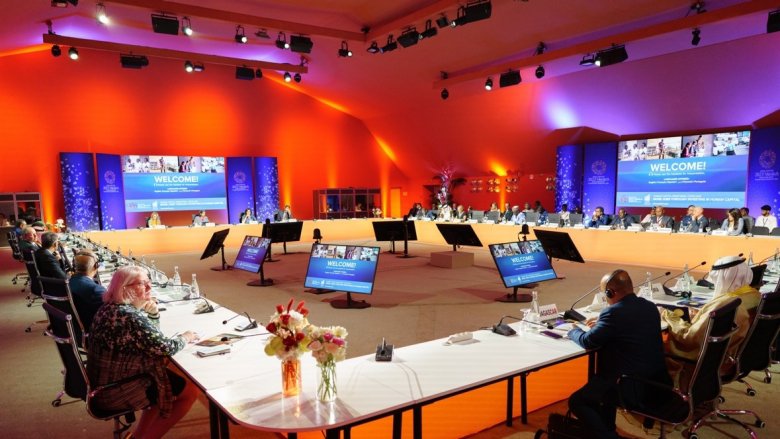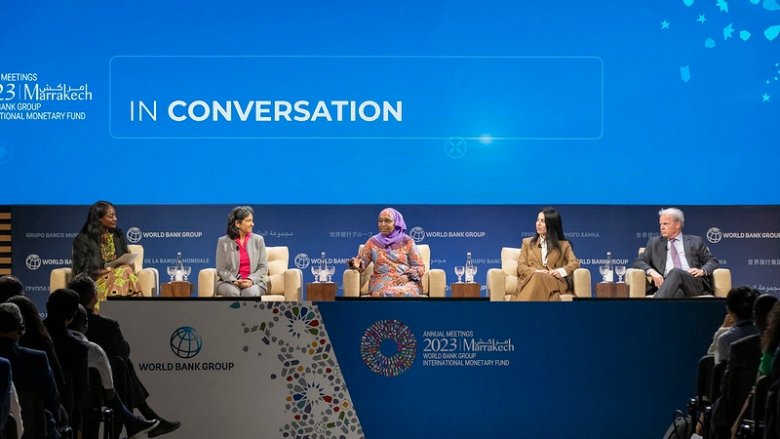At the 2023 Annual Meetings Human Capital Ministerial Conclave, 33 countries from the World Bank’s Human Capital Network considered how to connect people to good jobs and how to empower entrepreneurs to innovate and fuel growth. The October 13 Conclave marked the Network’s fifth anniversary as the premier global forum and knowledge exchange to advance investments in people.

Now is a critical time to generate jobs and power economies by investing in people. Let me be very blunt about the jobs challenge. Developing countries need to create one billion new jobs by 2050.
Ministers explored how to meet the urgent need to create more jobs in developing countries. Human Capital Network Co-Chair and World Bank Vice President for Human Development, Mamta Murthi, reflected that while solutions in each country will look different, ministers agreed on the importance of investing in human capital – people's knowledge, skills, and health.
Connecting People to Jobs
The discussion underscored that education and skills are the foundation for getting more people into jobs that improve their lives. Countries must ensure that people have basic math and literacy skills and prioritize continued learning across their lives. For example, Paraguay’s Minister of Finance spoke of attracting investment for jobs that people can do with training even if they lack formal education.
Reducing barriers to jobs for women and young people is also critical for many countries. Belgium’s Minister of Development Cooperation and of Major Cities called for governments, civil society, and the private sector to work together for more inclusive jobs. Egypt’s Minister of International Cooperation illustrated how vocational training and financial inclusion tailored to the needs of women and youth can help them succeed in the job market.
Finally, countries can connect people to opportunities in international labor markets. World Bank Managing Director for Operations, Anna Bjerde, highlighted a partnership between Morocco and Germany to train Moroccan youth and connect them with German companies that need skilled workers.
“Many people are simply not able to access the jobs that are available,” noted the World Bank’s Murthi.

Equipping Entrepreneurs and Investing in Innovation
In addition to helping people make the most of existing job opportunities, ministers emphasized investing in entrepreneurs as the world’s job creators.
We think of entrepreneurship mostly in terms of the big entrepreneurs, the ones who grow rapidly and create many hundreds of jobs. But most developing countries are full of small entrepreneurs.... How can these mini entrepreneurs be sustained?
Murthi drew attention to the range of entrepreneurs from self-employed micro-entrepreneurs to small and medium enterprises to larger firms that thrive on innovation. The World Bank supports smaller entrepreneurs through the Partnership for Economic Inclusion, and the Africa Higher Education Centers of Excellence are training the next generation of Africa’s scientists and teachers for innovations and jobs.
Countries shared their experiences equipping entrepreneurs large and small with skills and tools to manage risks. The Secretary for Ministry of Economic Affairs from Pakistan spoke of increasing productivity of informal workers by strengthening their access to credit, skills, and risk management, while Fiji’s Deputy Prime Minister discussed private sector partnerships to address skills shortages from migration.
Investing in innovation and realizing the potential of women and young people as entrepreneurs are also key. Djibouti’s Minister of Economy and Finance talked about vocational training and other business development services for youth, support to micro-enterprises, and improvements in digital technology services and skills. Similarly, Kenya’s Cabinet Secretary highlighted how the country is growing employment and entrepreneurship, particularly for young people, by helping them connect to the global digital economy.
Bringing in More Voices
The Conclave concluded with a conversation between Murthi and Indonesia’s Finance Minister on women’s entrepreneurship and how the Human Capital Network has contributed to elevating human capital as a priority in global policy dialogues.
Everybody, I think, agrees that human capital is very important for any economic progress. When we talk about productivity, prosperity, eradicating poverty, it always comes up with the human capital as the core.”
A public event followed the Conclave to reach a broader audience on jobs and human capital. The World Bank’s Mamta Murthi and Axel van Trotsenburg, Senior Managing Director, were joined by two entrepreneurs: Amal Hassan, Founder and CEO, Outsource Global of Nigeria; and Basima Abdulrahman, Founder & CEO of KESK, an Iraqi solar energy company.
Check out the public event and read the full Conclave summary.